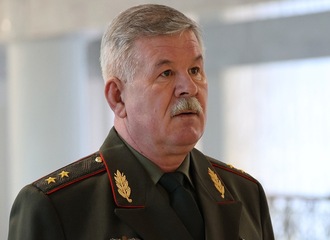Aliaksandr Lukashenka has set a referendum on the draft Constitution for February 27. The Decree No.14 of January 20 is officially published today on the National Legal Internet Portal and entered into force on the date of adoption. It shall be accompanied by amendments and additions to the Constitution submitted to a referendum.
In general, the draft Constitution submitted to the referendum coincides with the option that was previously proposed for public discussion. It gives the All-Belarusian People’s Assembly a constitutional status, defines its powers, redistributes the powers of the president, tightens the qualifications for presidential candidates, introduces a limit of two presidential terms for one person. However, in the draft Constitution submitted to the referendum, some additions appeared.
Thus, it is proposed in the new edition to state the first part of Article 4 of the Constitution: «Democracy in the Republic of Belarus is carried out on the basis of the ideology of the Belarusian state, as well as the diversity of political institutions and opinions.» Now the Basic Law states that democracy is carried out on the basis of a variety of political institutions, ideologies and opinions. At the same time, the article is supposed to retain the provision that the ideology of political parties, religious or other public associations, social groups cannot be established as mandatory for citizens.
Article 32 of the draft for the referendum retains the provisions on marriage as a union of a woman and a man, as well as on the fact that parents or persons in loco parentis are obliged to raise children, including «prepare for socially useful work, instill culture and respect for the laws, historical and national traditions of Belarus.» The same article was supplemented with the sentence «The state ensures the priority of raising children in the family.»
In Article 45 on health protection guarantees, the originally proposed phrase «Citizens are obliged to take measures to preserve and strengthen their own health» was replaced by a more general one: «Citizens take care of preserving their own health.»
Article 52 mentions the state symbols of Belarus. It is proposed to approve it in the following form: «Everyone who is on the territory of the Republic of Belarus is obliged to comply with its Constitution, laws, and respect the state symbols and national traditions of Belarus.»
The article on taking the oath by the elected president mentions members of the Presidium of the All-Belarusian People’s Assembly. They supplement the list of persons in whose presence the oath is taken. In the draft submitted for public discussion, they were not mentioned.
In the powers of the president, the mention of the fact that he establishes national days has disappeared. At the same time, it is prescribed that the president can not only award state awards, assign class ranks and titles, but also deprive them on the grounds provided for by law. The authority to establish national days in the draft submitted to a referendum has been transferred to the All-Belarusian People’s Assembly.
The draft clarifies the wording on the signing by the President of laws adopted by the House of Representatives and the Council of the Republic. He must sign them within two weeks. This period may be suspended if the President applies to the Constitutional Court with a proposal to verify the constitutionality of the law. The court is given no more than 10 days to render a decision. If the constitutionality of the law is confirmed, the president is given five days to sign it, if the court decides otherwise, the president returns the law to the House of Representatives.
The draft is also supplemented by a provision that government resolutions and orders of the Prime Minister must not contradict the laws and decisions of the President.
The draft submitted to the referendum excludes the possibility of electing judges of the Constitutional Court for a new term. They will only be elected for 11 years.
The section on final and transitional provisions provides that amendments and additions to the Constitution will enter into force 10 days after their publication. Previously, it was proposed that they enter from the date of official publication.
Article 143 excludes the part suggesting that changes to the Constitution relating to the activities of parliament would apply only to its new composition. At the same time, the restriction on the number of presidential terms for one person will be valid only from the date of assumption of office by the newly elected president.
Source: Reform.by


